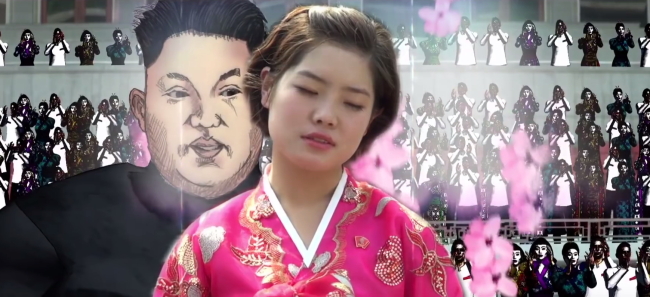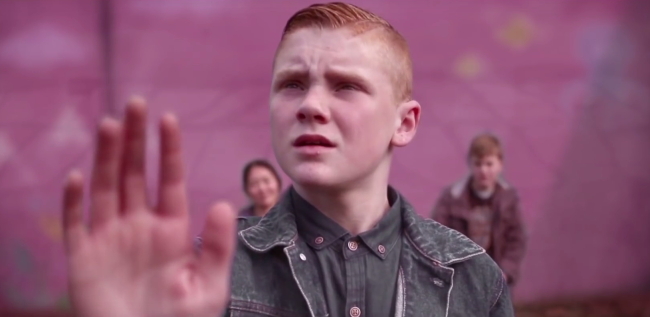When director David Kinsella first set foot in North Korea in 2014, what struck him most was not its expected desolation, the small army of government officials that met him at every turn, or how he was led to a hotel built exclusively for foreign visitors on an isolated island.
Rather, it was how obsessed with its “image” the hermit nation seemed -- how it strived to stage everything to perfection for the Irishman.
One of the first sites Kinsella was taken to was the giant mausoleum where the “Great Leader” Kim Il-sung lay, alongside valuable gifts he had received from totalitarian governments around the world.
“Imagine, a museum just to show gifts,” Kinsella told The Korea Herald in an interview Tuesday in Jung-gu, Seoul. “Talk about a real inferiority complex.”
The director was in Seoul to screen his documentary “The Wall” at the North Korean Human Rights International Film Festival, which ran from Oct. 21-23.
Kinsella, funded by the Norwegian Film Institute, was granted rare permission to film in North Korea and spent some two weeks in the reclusive country alone with a camera.
 |
Still from Kinsella’s documentary “The Wall” shows Young-hee against the backdrop of a computer animated Kim Jong-un. (David Kinsella) |
His original expectation of capturing the realities of the secretive state was thwarted the moment filming began. The subject of Kinsella’s documentary, Young-hee, a young girl from a poor village with a dream of studying at a university in Pyongyang and becoming a poet, turned out to be an actress handpicked by North Korea’s state-run film studio. The villagers and everyone else allowed in front of the camera, Kinsella discovered, were all extras. The towering buildings in Pyongyang’s technology zone were all empty.
“They had recruited over 1,000 extras in 15 days to create their utopia,” Kinsella said. “Even (Young-hee’s) walk was perfect, one foot directly in front of the other,” he recalled. “They’re creating a world that is so unreal, hoping everyone will believe it’s real.”
In one scene, which featured Young-hee attending a classical music concert, the orchestra stopped playing the minute Kinsella’s camera was turned off.
“After three minutes, they all stopped. The audience got up and walked away. All these telltale signs made me realize, this is all fake.”
 |
Director David Kinsella (David Kinsella) |
After each filming day, Kinsella was forced to hand over his footage to the censor department for inspection. He decided to film scenes with large blank spaces that he could later fill with computer animations, the un-fabricated reality he witnessed. The graphics work, done in Iceland, took over a year.
“I saw how they were manipulating me, so I had to use their (own) rule to tell my stories -- I had to use art and technology to say what I couldn’t.”
Kinsella was reminded strongly of his childhood in Belfast, Northern Ireland, which was wrought with a feud between Protestants and Catholics who regarded followers of the other religion as “pure evil.” He decided to incorporate scenes from his hometown into “The Wall” as well. What resulted was a film that is at once documentary, animation, fantasy and satire. It won Best Human Rights film award at the Galway International Film Festival in July.
Another affront Kinsell will “never forget” is the blatant racism he experienced in the North, he said.
“All foreigners are looked down on as silly stupid people that (the North Koreans) want to use to their advantage,” he said. “I’d never felt so discriminated against in my life.”
During one shocking dinner, Kinsella says he was told “not to lift his arms” as the film’s lead actress fed him pieces of barbecue. At the hotel, he would be presented each morning with “the most perfectly rolled omelet you’ve ever seen,” and food that was cooked to imitate European cuisine.
 |
Scenes from David Kinsella’s documentary “The Wall,” filmed partly in North Korea and in Belfast, Ireland. (David Kinsella) |
And somewhat paradoxical to the country’s professed values of stoic communism, “everybody was driven by money,” he said. “Everybody wants that golden watch on their wrist. Everybody’s snitching on each other.”
But Kinsella believes that citizens of even the most democratic country can potentially become “mindless slaves” if they let others define their reality. “North Korea just happens to be extreme. It happens everywhere, just in smarter ways.”
The purpose of his films is to “let people decide for themselves what’s right and what’s wrong,” he said.
The director of socially provocative documentaries such as “Killing Girls,” which traces the history of abortion in Russia, and “The Beautiful Tragedy,” the dark tale of an anorexic ballet star, Kinsella hopes to continue telling “complicated” stories. His upcoming film will be a personal tale of romance, examining what shattered a past relationship.
And after some three weeks in Seoul, Korea, he says, it is the “most fantastically complicated” country he has ever seen. “All these unwritten rules! All these extremes. It’ll take me years to fully understand it.”
By Rumy Doo (
doo@heraldcorp.com)






![[Weekender] Korea's traditional sauce culture gains global recognition](http://res.heraldm.com/phpwas/restmb_idxmake.php?idx=644&simg=/content/image/2024/11/21/20241121050153_0.jpg)



